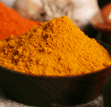Curcumin Protects the Brain from Inflammatory Stress

Stress happens, that is a fact of life. Your ability to manage any type of stress and withstand the pressure is essential for survival and good health. A new study shows that curcumin1 can protect your brain in a way that enables less inflammation from stress.
In this study pigs were exposed to stress. Those given curcumin had a different response in the protective mechanisms in their brain. Curcumin did not seek to regulate the stress response, i.e., blunt cortisol or in some other way interfere with how the body was seeking to react to stress. Rather, curcumin reduced the friction generated by stress. Specifically, curcumin reduced the inflammatory iNOS signaling in the brain while preventing a drop in the brain-helping BDNF.
Inflammation generates free radicals as a by-product, which damage brain cells and speed brain aging. There are many types of free radicals and many of these are made routinely as part of normal metabolism and then deactivated as part of normal metabolism as long as you have basic antioxidants like vitamin E in your brain cells. Then there is the most damaging of all free radicals, peroxynitrite. If this free radical gets going in your brain, as is common in situations of excitotoxicity, then you are in big trouble in terms of accelerated deterioration of your nervous system. Another new study2 shows that curcumin directly protects against peroxynitrite nerve damage by boosting the antioxidant defense and protecting cells.
Since low-grade inflammation and free radical damage in the brain are associated with just about every form of cognitive and nerve malfunction, curcumin is one nutrient that can help offset this type of problematic stress.
In this study pigs were exposed to stress. Those given curcumin had a different response in the protective mechanisms in their brain. Curcumin did not seek to regulate the stress response, i.e., blunt cortisol or in some other way interfere with how the body was seeking to react to stress. Rather, curcumin reduced the friction generated by stress. Specifically, curcumin reduced the inflammatory iNOS signaling in the brain while preventing a drop in the brain-helping BDNF.
Inflammation generates free radicals as a by-product, which damage brain cells and speed brain aging. There are many types of free radicals and many of these are made routinely as part of normal metabolism and then deactivated as part of normal metabolism as long as you have basic antioxidants like vitamin E in your brain cells. Then there is the most damaging of all free radicals, peroxynitrite. If this free radical gets going in your brain, as is common in situations of excitotoxicity, then you are in big trouble in terms of accelerated deterioration of your nervous system. Another new study2 shows that curcumin directly protects against peroxynitrite nerve damage by boosting the antioxidant defense and protecting cells.
Since low-grade inflammation and free radical damage in the brain are associated with just about every form of cognitive and nerve malfunction, curcumin is one nutrient that can help offset this type of problematic stress.
Referenced Studies
- ^ Curcumin Reduces Parameters of Nerve Stress Domest Anim Endocrinol. Wei S, Xu H, Xia D, Zhao R.
- ^ Curcumin Reduces Peroxynitrite in Nerve Cells Neurotoxicology. Liu W, Fan Z, Han Y, Lu S, Zhang D, Bai X, Xu W, Li J, Wang H.
Share This Article
Search thousands of health news articles!
